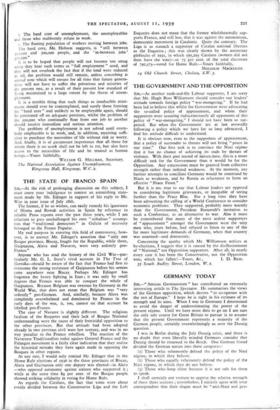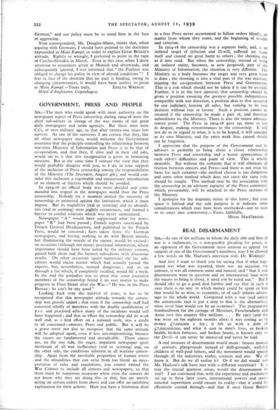GERMANY TODAY SIR,—" Amicus Germanorum " has contributed an extremely
interesting article to The Spectator. He summarises the views of the German opposition, which desires "to co-operate with the rest of Europe." I hope he is right in his estimate of its strength and its aims. When I was in Germany I determined to avoid the danger of underestimating the power of the present regime. Until we have more data to go on I am sure the only safe course for Great Britain to pursue is to assume that the present Government represents a majority of the German people, certainly overwhelmingly so over the Danzig question.
I was in Berlin during the July Danzig crisis, and there is no doubt that even liberally minded Germans consider that Danzig should be returned to the Reich. One German friend divided the German nation into three categories :
(t) Those who vehemently defend the policy of the Nazi regime, in which they believe.
(2) Those who equally vehemently defend the policy of the Nazi regime, in which they do not believe.
(3) Those who keep silent because it is not safe for them to speak.
I shall certainly not venture to apprise the relative strength of these three sections ; nevertheless, I entirely agree with your correspondent that their slogan must be "anti-Nazi and pro-
German," and our policy must be to stand firm in the face of aggression.
Your correspondent, Mr. Douglas-Mann, thinks that, when arguing with Germans, I should have pointed to the doctrines expounded in Mein Kampf, in order to explain Great Britain's attitude. Rightly or wrongly, I preferred to point to the rape of Czecho-Slovakia in March. Even in this case, when I drew attention to assurances given at Munich and afterwards, and subsequently ignored, I was informed that "the Fuehrer was obliged to change his policy in view of altered conditions "! I fear in face of the doctrine that no pact is binding, owing to changing circumstances, it would have been useless to point









































 Previous page
Previous page